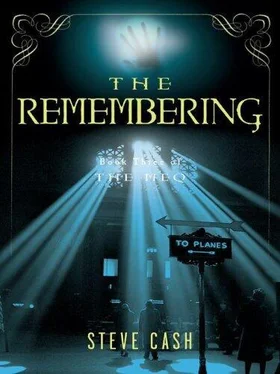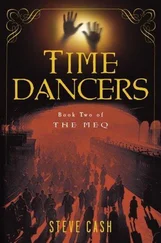As Jack explained it, through an ally in Army Intelligence, Cardinal had discovered a top-secret file concerning a “black” operation code-named “SCAR,” which was being run by Blaine Harrington. Under the auspices of Army Intelligence he had converted a small ten-acre ranch outside San Diego into a kind of laboratory or prison where only one subject was being held and studied. The subject was a badly scarred female child who apparently had not aged, changed, spoken, or acknowledged anyone in nine years. They found her blood type did not make sense because it did not even exist in modern humans. They were studying the body chemistry of the girl to unlock the secret and potential power within such chemistry. Army Intelligence thought there might be strategic purposes for this knowledge, and they were going to make certain the United States had it first.
Jack talked for half an hour. I listened to every word, but as he spoke I kept feeling a strange sensation throughout my body, as if my legs and arms were waking up or anticipating something that was about to happen.
“Where did they capture this girl?” Sailor asked.
In a matter of seconds the sensations I’d been feeling increased tenfold. I felt a presence, almost a glow. My skin flushed and tingled.
Jack shook his head back and forth. “She wasn’t captured, Sailor. She was found.”
“Where?” I asked.
Jack said, “That’s the crazy part, Z.”
“Where, Jack?”
“Nagasaki. Three weeks after the bomb dropped, she was found wandering through the rubble like a ghost.”
“Zuriaa!” Sailor and I said simultaneously. My heart was pounding, and I heard or felt someone behind me, silently slipping through the house from the front door to the dining room to the kitchen.
“Zuriaa?” Ray almost shouted, rising out of his chair. “You mean to tell me my sister is alive?”
I looked at Ray, but I could feel her behind me.
“No,” she said from the shadows. Everyone turned at once toward the voice. “Zuriaa is dead, Ray, and I shall beg your forgiveness for as long as I live.” She took two steps into the light of the kitchen. Her beautiful black eyes were staring directly at Ray. It was Opari. “Five days ago,” she said, “I slit her throat from ear to ear.”
The next day, March 1, 1954, on the Bikini Atoll in the Pacific Ocean, the United States conducted its second hydrogen bomb test. The fifteen-megaton blast was much bigger than anyone expected, erasing the atoll forever and leaving in its place a deep radioactive scar. In St. Louis a brand-new American and flawless seven-pound, eight-ounce baby girl, Georgia Caitlin Croft, was only a day old.
People talk sometimes of bestial cruelty, but that’s a great insult to the beast, a beast can never be so cruel as a man, so artistically cruel.
— Ivan,
The Brothers Karamazov
16,355 years BCE
Northern Caucasus Mountains
He used the late light of day to gather the sweetest scented wood and the only berries still available. He was now too weak to hunt for meat. It was the time of year when leaves fell from the trees and berries were rare. The task would take him far from the cave, but he would return in time to look out over the river and watch the sun setting in the west. He stood motionless at the entrance to the cave. He could feel the cold air coming down from the north. He knew it would be much colder in another two moons and snow would soon follow. Tonight, he thought, tonight will be a good night to die. He scanned the horizon once more, made the simple gesture for farewell, then turned and entered the cave. The others were waiting for him, huddled around the fire pit. They were too weak and sick to leave the cave. He didn’t know how long they each had been alive, but he knew it was a long, long time. None of them had ever been sick. Their kind did not know sickness. He exchanged looks with each one. All agreed with him. They knew what he knew. They didn’t have to speak. They used few words, yet their conversations were deep. As far as they knew, they were the last ones. The fire burned late into the night. In silence, they each positioned themselves into the special arrangement and closed their eyes. They found the Voice between them, and without a word, one by one, drifted away on the stream of the Long Dream.
In the end, there is nothing left. It all goes back, it all returns to nothing. Piece by piece, stage by stage, we disintegrate and disappear. Our
last breath is first to go, along with self, spirit, love, mind, all gone. Poof! Then the body begins its inexorable degradation. The soft parts fade quickly. Flesh, organs, muscle, sinew, all rot and decay. Only bone remains. Bone is our last trace, our last message … our last echo.
When Opari appeared in Carolina’s kitchen, she spoke for nearly an hour. During her long story, she used several Meq words and phrases I had never heard before. They were words dating back to the Time of Ice and beyond. Opari and her sister, Deza, learned the words from their mother as children. The words describe certain actions, abilities, and states of mind common only to the Stone of Blood. Most have to do with practical healing techniques, but two are quite different. The first ability is called “Bihotzarin”—the Heartlight. Opari said the word matter-of-factly in an even voice. It is a unique ability somewhat like echolocation in bats, where Opari is able to find certain other Meq who are in profound distress, except that she uses her own heartbeat and the practice is more mystical than medicinal. The second is an act, an extreme act, and Opari said the word in a whisper with tears running down her cheeks. The ancient word is “Kanporurrike.” Loosely translated, it means “beyond compassion,” and it is the name for the act that killed Zuriaa.
During World War II, Opari was living in Hong Kong with the current generation of an old and wealthy family named Liang. They are a family of dealers and traders she has known and trusted at various times for the last three hundred years. Most of their businesses were and are legal, but a few of their interests blur the line or erase it entirely. Zeru-Meq also knows this family well. After the war, he managed to contact Opari through a cousin living in Macao. Once together, and having no knowledge of what had occurred in Japan, Opari and Zeru-Meq continued their search for the Fleur-du-Mal. They spent the next eight years in a futile and frustrating effort, finding little or nothing and hearing less. Then, a brief encounter and a few overheard remarks by a member of the Liang family changed everything and suddenly made the search for the Fleur-du-Mal irrelevant.
David Liang Wen liked to call himself a “broker of information,” but in truth he was a spy for hire. In January 1954 he was working in Hong Kong and Tokyo for the Soviets. In Tokyo, he went to a meeting with his contact, and the man was talking with another man as he approached. The men were speaking Russian and they must have assumed he didn’t know the language because they finished their conversation before switching to Chinese. But David Liang Wen did speak Russian. He overheard his contact ask the other man, who he called Valery, “Is this true, have the Americans captured one of these strange children who do not age?” “Yes,” Valery answered, “they are holding her now outside San Diego, California. I know the fool in charge. Do not worry.” Valery smiled and changed to Chinese, introducing himself and saying something innocuous about the good food in Hong Kong. Then he excused himself and left.
Upon learning what David Liang Wen had overheard, Opari and Zeru-Meq made a rapid decision. Opari would travel to the United States to investigate and Zeru-Meq would leave for the Middle East, where he knew Geaxi and Mowsel were living. They would discuss the situation and try to reach the rest of us.
Читать дальше












